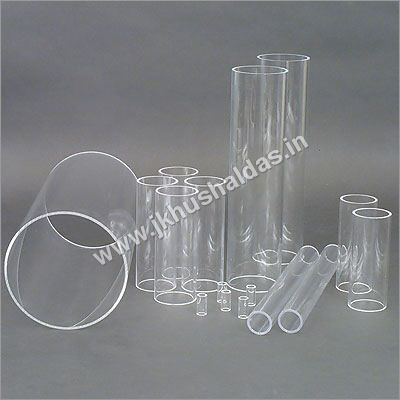Product Description
Acrylic Pipe
Our company is a reckoned enterprise and is engaged in providing fine quality Standard Acrylic Pipe that is appreciated for its unaffected nature in corrosive atmosphere. This acrylic pipe is designed using the best quality acrylic under the supervision of our vendors. Offered Standard Acrylic Pipe is tested by our vendors prior to dispatch it from their end. Clients can easily avail the offered pipe in different thickness and lengths at an affordable price range.
Features:
- Compact design
- Durability
- Light weight
- Stiffness
We are presenting a panoramic radius of Standard Acrylic Pipes. They are utilized in many industries for carrying out various technical applications because of their strong body structure and impact resistance. These pipes act as perfect substitute for glass pipes owing to which they have gained widespread popularity. The Standard Acrylic Pipes are according to the norms of quality laid at a global level. They can perform for decades without any kind of trouble. They are checked on various quality parameters to ensure their optimum utilization.
Acrylic Pipes (Extruded):
From 6 x 10 mm ID / Od to 50 x 60 mm ID / OD Length up to 2 meters or any other specified sizes in bulk quantity.
Acrylic Pipes (Cast):
From 70 mm to 600 mm OD in 3 mm 10 mm wall thickness. In lenth up to 1000 mm. or any other specified sizes in bulk Quantity.
Polycarbonate Pipes:
From 17 x 25 ID / OD to 61 x 64 ID / OD in 1 meter length.
| Physical Properties |
|
|
|
|
| Density | 1.19 g/cc |
| ASTM D792 |
|
Mechanical Properties
|
|
| Tensile Strength, Ultimate | 54 MPa |
| ASTM D638 |
| Elongation at Break | 2.4 % |
| ASTM D638 |
| Modulus of Elasticity | 2.8 GPa |
| ASTM D638 |
| Flexural Yield Strength | 81 MPa |
| ASTM D790 |
|
Thermal Properties
|
|
| Maximum Service Temperature, Air | 73°C |
| Deflection temperature at 1.8 MPa |
| Deflection Temperature at 1.8 MPa (264 psi) | 73°C |
| ASTM D648 |
| Vicat Softening Point | 90°C |
| ASTM D1525 |
| Flammability, UL94 | HB |
| |
|
Optical Properties
|
|
| Transmission, Visible | 92 % | 92 % | Luminous Transmittance, ASTM D1003 |
Exceptional Transparency and StrengthWith a light transmittance rate of 92%, our acrylic pipes provide crystal-clear visibility alongside structural durability. The PMMA material ensures a smooth cylindrical shape, making these pipes suitable for industries requiring both visual appeal and performance in demanding environments.
Versatile Sizing and Industrial UsageAvailable in outer diameters ranging from 10 mm to 310 mm, our acrylic tubes cater to diverse industrial requirements. The customizable thickness options and standard lengths allow for tailored solutions across various sectors, including manufacturing, construction, and laboratory setups.
FAQs of Acrylic Pipe:
Q: How can these acrylic pipes be used in an industrial setting?
A: These acrylic pipes are commonly utilized in industrial applications such as fluid transfer, sight glass inspection, decorative installations, and protective casings due to their transparency, chemical resistance, and mechanical strength.
Q: What is the typical process for manufacturing these acrylic pipes?
A: Our acrylic pipes are manufactured using the extrusion molding process. This involves heating PMMA until it becomes pliable and then forcing it through a die to achieve the desired cylindrical shape and dimensions.
Q: When should I choose acrylic pipes over other materials?
A: Acrylic pipes are ideal when high optical clarity, UV resistance, and lightweight construction are required. They are excellent alternatives to glass in applications where clarity and durability are needed without the fragility of glass.
Q: Where are these pipes commonly exported from, and who are the primary users?
A: These pipes are primarily exported from India and supplied globally to industries such as manufacturing, laboratory research, and construction, where durable and transparent tubing solutions are essential.
Q: What benefits do acrylic pipes offer, particularly with a density of 1.2 and 1.15 g/cm?
A: Acrylic pipes with these densities strike a balance between strength and lightweight properties. This ensures ease of handling and installation, while maintaining rigidity for industrial use.
Q: What maintenance is required for these acrylic pipes?
A: Acrylic pipes are relatively low maintenance. Regular cleaning with mild soap and water preserves their clarity and appearance, while avoiding abrasive cleaners helps maintain the surface integrity.
Q: How can I find specific details on hardness and surface treatment for these pipes?
A: For comprehensive information regarding hardness ratings and available surface treatments, please visit our website or contact our technical support team for tailored advice.






